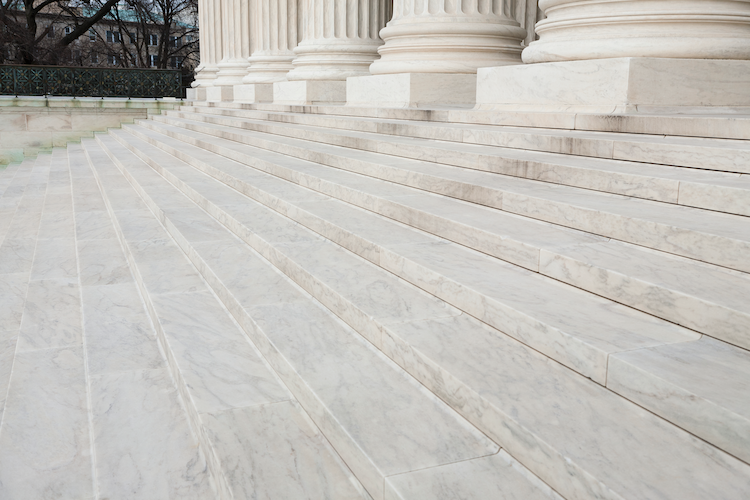SCOTUS Concludes Oral Arguments for the Term

The U.S. Supreme Court has concluded its oral arguments for the 2022-2023 Term. The Court’s final week included four cases, with issues ranging from bankruptcy to RICO to government takings.
Below is a brief summary of the issues before the Court:
Lac du Flambeau Band of Lake Superior Chippewa Indians v. Coughlin: The case seeks to resolve a circuit split over the sovereignty of Indian tribes. As separate sovereigns pre-existing the Constitution, Indian tribes have the same common-law immunity from suit traditionally enjoyed by sovereign governments—unless and until Congress unequivocally expresses its intent to abrogate that immunity. While the Bankruptcy Code abrogates the sovereign immunity of “governmental units,” the statute does not refer to Indian tribes in defining that term (or anywhere else). Instead, the Code provides a list of specific federal, state, local, and foreign entities, and then adds “or other foreign or domestic government” in a residual clause. The Supreme Court has agreed to resolve a circuit split over whether the Bankruptcy Code expresses unequivocally Congress’s intent to abrogate the sovereign immunity of Indian tribes.
Dupree v. Younger: The cases centers onthe preservation of legal claims for appeal. Parties may appeal only from “final decisions of the district courts.” Under this general rule, “[a]n appeal from the final judgment brings up all antecedent issues,” In re Kilgus, 811 F.2d 1112, 1115 (7th Cir. 1987), and that “all interlocutory orders are reviewable on appeal from the final decree. Gloria Steamship Co. v. Smith, 376 F.2d 46, 47 (5th Cir. 1967). The federal courts of appeal have are divided over whether purely legal claims denied at summary judgment are reviewable on appeal after a jury trial where those claims have not been reasserted in a post-trial motion. The issue before the justices is “[w]hether to preserve the issue for appellate review a party must reassert in a post-trial motion a purely legal issue rejected at summary judgment.”
Yegiazaryan v. Smagin: The case involves when plaintiffs can bring private claims under the Racketeer Influenced and Corrupt Organizations Act (RICO). In RJR Nabisco, 579 U.S. 325, 354 (2016), the Supreme Court, applying the presumption against extraterritoriality, held that a civil RICO plaintiff states a cognizable claim under RICO’s private right of action only if it alleges a “domestic” and not foreign-injury. The Court did not address what legal test determines whether an injury is foreign or domestic. Accordingly, the justices have agreed to answer the following question: “Does a foreign plaintiff state a cognizable civil RICO claim when it suffers an injury to intangible property, and if so, under what circumstances.”
Tyler v. Hennepin County, Minnesota: The case involvesHennepin County’s confiscation and sale of 93-year-old Geraldine Tyler’s former home as payment for approximately $15,000 in property taxes, penalties, interest, and costs. The County sold the home for $40,000, and, consistent with a Minnesota forfeiture statute, kept all proceeds. Most states allow the government to keep only as much as it is owed; any surplus proceeds after collecting the debt belong to the former owner. However, in Minnesota and a dozen other states, local governments take absolute title, extinguishing the owner’s equity in exchange only for cancelling a smaller tax debt, code enforcement fine, or debt to government agencies. The Court will decide the following questions: “(1) Whether taking and selling a home to satisfy a debt to the government, and keeping the surplus value as a windfall, violates the Fifth Amendment’s takings clause; and (2) whether the forfeiture of property worth far more than needed to satisfy a debt, plus interest, penalties, and costs, is a fine within the meaning of the Eighth Amendment.”
The Supreme Court is expected to issue opinions in the cases prior to the end of the Term in June. Please check back for updates.
Previous Articles
Supreme Court Upholds Tennessee Law Banning Transgender Care for Minors
by DONALD SCARINCI on July 10, 2025
In United States v. Skrmetti, 605 U.S. ____ (2025), the U.S. Supreme Court held that Tennessee’s ...
Supreme Court Rejects Mexico’s Suit Against U.S. Gun Manufacturers
by DONALD SCARINCI on July 8, 2025
In Smith & Wesson Brands v. Estados Unidos Mexicanos, 605 U.S. ____ (2025), the U.S. Supreme Co...
SCOTUS Sides With Employee in Reverse Discrimination Case
by DONALD SCARINCI on July 2, 2025
In Ames v. Ohio Department of Youth Services, 605 U.S. ____ (2025), the U.S. Supreme Court held tha...
The Amendments
-
Amendment1
- Establishment ClauseFree Exercise Clause
- Freedom of Speech
- Freedoms of Press
- Freedom of Assembly, and Petitition
-
Amendment2
- The Right to Bear Arms
-
Amendment4
- Unreasonable Searches and Seizures
-
Amendment5
- Due Process
- Eminent Domain
- Rights of Criminal Defendants
Preamble to the Bill of Rights
Congress of the United States begun and held at the City of New-York, on Wednesday the fourth of March, one thousand seven hundred and eighty nine.
THE Conventions of a number of the States, having at the time of their adopting the Constitution, expressed a desire, in order to prevent misconstruction or abuse of its powers, that further declaratory and restrictive clauses should be added: And as extending the ground of public confidence in the Government, will best ensure the beneficent ends of its institution.





